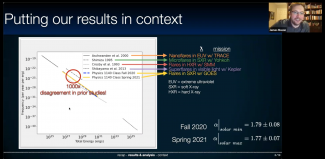During the Fall 2020 term, when faced with the challenge of instructing a large (400+ student), introductory physics lab virtually, we redesigned the entire course to create a unique experience for the students --a CURE. Course-based undergraduate research experiences (CUREs) involve students in authentic research by engaging students in inquiries where neither the students nor the instructor know the answer. CUREs have been shown to have a multitude of benefits including (1) the potential to make research opportunities available to students who do not typically have access to research (Bangera & Brownell, 2014), (2) allowing students experience novel research in a supportive setting and the opportunity to develop a sense of ownership of their lab course work (Corwin et al., 2018), and (3) the incorporation of CUREs has been shown to help graduation rates (Rodenbusch et al., 2016) and persistence in STEM (Hanauer et al., 2016).
During the virtual lab, where it was not feasible for students tinker with instruments nor engage in-person with classmates, we sought to provide them with an opportunity to engage in an authentic research experience. We partnered with Dr. James Mason at Laboratory for Atmospheric and Space Physics (LASP) at the University of Colorado Boulder (CU) to study the relationship between the energy of solar flares and how frequently they occur.
CU Boulder's Physics 1140 students engaged in a 15-week-long course that allowed them to work and contribute to this research project. Students worked in teams of 3-4 students over Zoom to choose a flare from the Space Weather Data Portal, do a background correction, and report the total energy of the flare. The students then pulled all the individual flare data together to determine the relationship between flare energy and frequency.
Course Materials
Instructors who would like to get access to the related course materials for this course should email lewandoh@colorado.edu.



 The Physics Frontiers Centers (PFC) program supports university-based centers and institutes where the collective efforts of a larger group of individuals can enable transformational advances in the most promising research areas. The program is designed to foster major breakthroughs at the intellectual frontiers of physics by providing needed resources such as combinations of talents, skills, disciplines, and/or specialized infrastructure, not usually available to individual investigators or small groups, in an environment in which the collective efforts of the larger group can be shown to be seminal to promoting significant progress in the science and the education of students. PFCs also include creative, substantive activities aimed at enhancing education, broadening participation of traditionally underrepresented groups, and outreach to the scientific community and general public.
The Physics Frontiers Centers (PFC) program supports university-based centers and institutes where the collective efforts of a larger group of individuals can enable transformational advances in the most promising research areas. The program is designed to foster major breakthroughs at the intellectual frontiers of physics by providing needed resources such as combinations of talents, skills, disciplines, and/or specialized infrastructure, not usually available to individual investigators or small groups, in an environment in which the collective efforts of the larger group can be shown to be seminal to promoting significant progress in the science and the education of students. PFCs also include creative, substantive activities aimed at enhancing education, broadening participation of traditionally underrepresented groups, and outreach to the scientific community and general public.